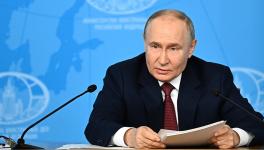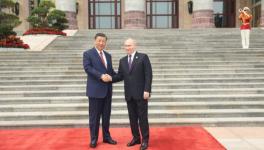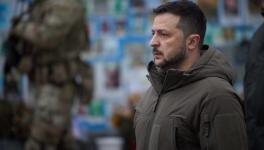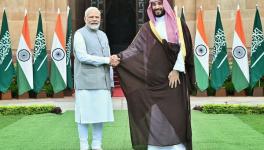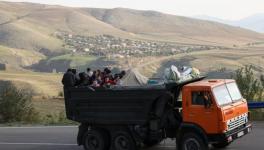The West Has No Standing on Hagia Sophia
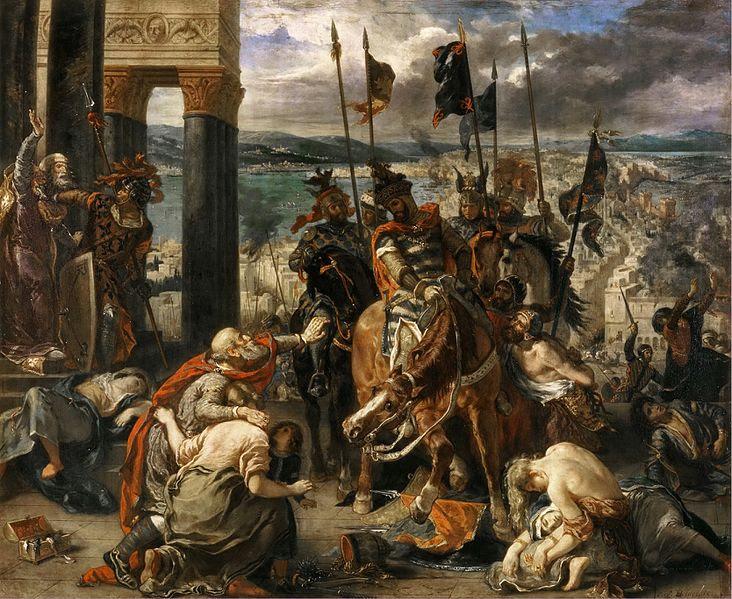
A defining moment came, rather unnoticed, when the foreign ministers of the European Union (EU) held a virtual meeting on July 13 where the group’s relations with Turkey were on the agenda.
The resumption of Muslim prayers in the Hagia Sophia in Istanbul came up for discussion. This was how the EU’s foreign policy chief Josep Borrell later summed up the debate:
“Turkey is an important country for the EU with whom we would wish to see our relations strengthened and developing. This should be done in respect of EU values, principles and interests… There was a consensus among member states that EU-Turkey relations were currently under strain because of worrying developments affecting the EU’s interests, in particular in the Eastern Mediterranean and Libya…”
“Ministers also condemned the Turkish decision to convert Hagia Sophia back to a mosque as this decision will inevitably fuel mistrust, promote renewed divisions between religious communities and undermine efforts at dialogue and cooperation. There was broad support to call on the Turkish authorities to urgently reconsider and reverse their decision.”
The EU has a troubled relationship with Turkey due to the “current confrontational dynamic” over the oil and gas exploration in the Eastern Mediterranean and Turkey’s intervention in Libya, which “affect the EU’s interests”. Hagia Sophia is a secondary issue. Yet, there was “broad support” to call on the Turkish government to reverse the decision on Hagia Sophia.
Nonetheless, the consensus opinion is not to confront Turkey, but to engage it to “explore further paths” to lower tensions and reach understandings over the “worrying developments affecting the EU’s interests, in particular in the Eastern Mediterranean and Libya”.
In sum, the developments over Hagia Sophia will not set EU-Turkey on collision course. A confrontation with Turkey can be risky. Besides, there could be varying shades of opinion within the EU. A few European states at least would recall that the EU behaved like a Christian club by admitting the newly-born Balkan states while keeping out “Muslim Turkey”, which has been knocking on its doors for decades, has no dearth of democratic credentials and has much more to offer as partner.
We tend to overlook that President Recep Erdogan’s decision on Hagia Sophia is essentially political in nature — resuming Muslim prayers but allowing non-Muslims also to visit the building. He has in effect reversed an “administrative decision” taken by Ataturk in 1934, a decade after the modern Turkish state was proclaimed on 29th October 1923 with Mustafa Kemal as its first president.
Ataturk didn’t consult the national opinion when he decided that Muslim prayers should be discontinued in Hagia Sophia. If a referendum is held today, the Turkish people will doubtlessly endorse Erdogan’s decision. To be sure, Erdogan himself must be aware that he took an immensely “popular” decision. Turkey is not a regimented society and a section of opinion, especially those leaning toward westernism, would feel perturbed that Turkey is turning its back on the “West”.
However, this is not a struggle between secularism and Islamism. The secular temper of the Turkish nation is centuries-old, dating back to the Ottomans. While the Ottoman Empire was inspired and sustained by Islam and Islamic institutions, its success is to be attributed to its highly pragmatic political culture, taking the best ideas from other cultures and making them their own.
The economic strength of the Empire owed much to the policy of increasing the number of traders by encouraging merchants to move to Istanbul — even by forcibly resettling merchants from captured territories. Notably, the Ottomans encouraged Jewish traders from Europe who suffered persecution under Orthodox Christian rulers to migrate to Istanbul and set up business.
Non-Muslim communities were organised according to the millet system, which gave minority religious/ethnic/geographical communities a limited amount of power to regulate their own affairs under the overall supremacy of the Ottoman administration. Curiously, the first Orthodox Christian millet was established in 1454 within a year of the capture of Constantinople by Sultan Mehmet II. This brought Orthodox Christians into a single community under the leadership of the Patriarch who had considerable authority given to him by the Sultan.
Armenian Christian, Jewish and other millets followed in due course. Some millets paid tax to the state, while most were exempted because they were deemed to be performing services of value to the state. Although Mehmet I converted many churches into mosques, he did not suppress the Christian faith itself.
In his calculus, Christians being the largest group of the population, coexistence was likely to be more efficient than conflict; and, secondly, the institutions of the church provided a platform for implementing Mehmet’s rule. All in all, Ottomans were influenced by the Islamic rule that Muslims should show respect to all religions.
The Sultan kept control of the non-Muslim communities (millets) through their religious leaders. And these communities were given their own parts of towns in which to live and worship. They were given a great deal of freedom to lead their lives according to their faiths, and so were largely supportive of their Muslim overlords.
Also read: Russia, China Keep the ‘Dragon in the Fog’
A recap of history is necessary, as in reality, Erdogan’s decision on Hagia Sofia is a celebration of Turkish nationalism. On one plane, it is an expression of Turkey’s profound disillusionment with Europe while on the other hand, as a prominent Turkish columnist close to the ruling elite, Yusuf Kaplan, wrote this week, “It is Turkey’s recovery, reclaim of its identity, history and spirit, its mental liberation… The re-opening of the Hagia Sophia Mosque is the spark that will trigger the great journey we have been called upon so that we can escape the web spun by the West – and which we had entered voluntarily – to build the new age…
“Hagia Sophia is a very powerful expression of the guarantee for non-Muslims’ religious freedom and for them to build their lives around their own faith under the sovereignty of Muslims… The conversion of Hagia Sophia burdens us with a great obligation.”
Kaplan’s last sentence has great poignancy. For, Hagia Sophia has a tragic history but not at the hands of the Ottoman Sultans.
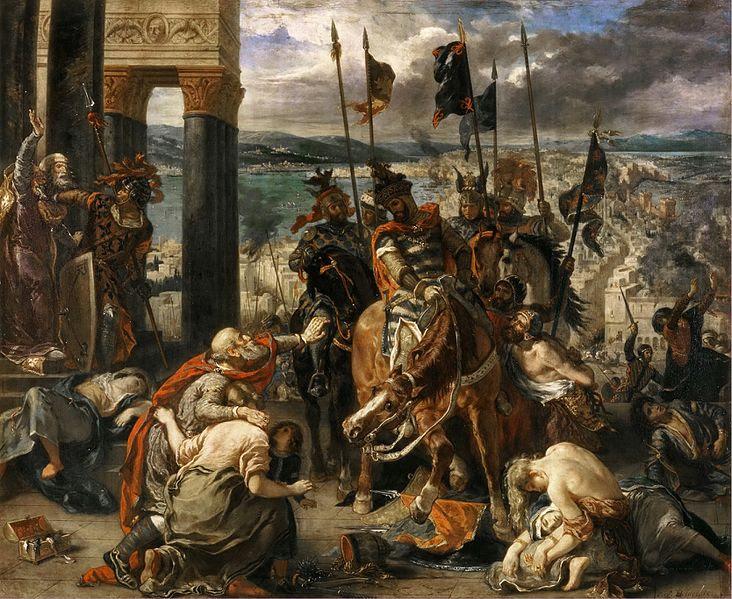
Entry of the Crusaders in Constantinople, work by the French Romantic artist Eugène Delacroix (1840)
In 1204, the knights of the Fourth Crusade set fire to Constantinople, and went on a fiendish work of plunder, lust, and blood. The Catholic victors heaped insult on the ceremonies and the churches of the Greek faith and they didn’t spare Hagia Sophia. The Crusaders reduced the Byzantine Empire to a miserable wreck and the wealth and splendour of Constantinople was gone, its commerce neglected and ruined.
Three great fires, kindled by the victorious Crusaders, had left a large part of Constantinople a dreary waste of ashes and blackened ruins. Against this backdrop of an empire in great distress, the Turkish emirs, now stronger than the Emperors, began crowding the Greeks steadily back to the sea.
The new power advanced with rapid strides, and Asia Minor was soon lost forever to the Greeks. But the Turks wouldn’t be confined to Asia. They crossed the narrow straits of the Bosphorus and the Dardanelles, and soon Turkish mercenaries became the principal military reliance of the imperial government in Constantinople. The Turks eventually made Constantinople the capital of their own Empire.
Today, with what face can Christian Europe — or the Papacy for that matter —chastise Turkey? Across the Atlantic, President Trump has said not a word. It has been left to the two poles of Eastern Christianity — Greece and Russia — to set aside their rivalries for the soul of the Orthodox believers to rebuke Turkey — more for record.
Also read: EU Summit to Reboot India’s World Outlook
Get the latest reports & analysis with people's perspective on Protests, movements & deep analytical videos, discussions of the current affairs in your Telegram app. Subscribe to NewsClick's Telegram channel & get Real-Time updates on stories, as they get published on our website.










